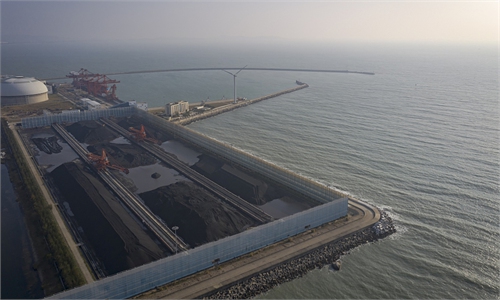COMMENTS / EXPERT ASSESSMENT
Coal supply shortages should not be used in politicized attack

Illustration: Tang Tengfei/Global Times
Recent power shortages that are affecting many major economies in the world are jeopardizing India's hard-won economic recovery from the COVID-19 pandemic. India's power plants are reportedly running dangerously short of coal. As many as 63 of the 135 coal-fired power plants in the country have only two days - or less - of coal supplies.
The first major coal supply shortage in the world's clean-power transition era is pushing prices for the fuel to record highs. Australia's Newcastle thermal coal, a global benchmark, is trading at $202 a metric ton, three times higher than at the end of 2019, according to The Wall Street Journal.
Coupled with the recent surge in European natural gas prices and international oil prices, a worrying global energy crisis seems imminent. However, careful analysis shows that it is only a temporary imbalance between supply and demand caused by various reasons in a special period.
From the demand side, most of the world's major economies are currently recovering from the pandemic, which has led to a short-term surge in energy demand. From the supply side, the production of global crude oil, natural gas and coal production capacity is sufficient to guarantee the demands. For instance, part of the current surge in international oil prices is due to OPEC's production restriction policy. In addition, the world is undergoing a transition from traditional fossil fuels to cleaner energy sources, which inevitably impacts supply over short term.
In China's case, in order to fulfill its commitment to reduce carbon emissions, China is actively promoting the development of clean energy industries and strictly restricting capacity of traditional coal mining and other polluting industries. Recent power outages in many areas of China were partly due to related capacity restriction measures. This is fundamentally different from the cause of the recent shortage of coal and electricity supply in neighboring India.
Official data reveals that China's installed power generation capacity was 2.24 billion kilowatts as of the end of May, which is sufficient for China's total electricity consumption demands. Among the country's total installed power generation capacity, installed wind power capacity accounted for 290 million kilowatts, a year-on-year increase of 34.4 percent; installed solar power capacity was 260 million kilowatts, a year-on-year increase of 24.7 percent, which show China's concrete efforts to promote clean energy.
During times that major economies are experiencing difficulties and energy supply shortages, some foreign media outlets have used the topic to hype the tension between China and Australia on the issue of coal trade. India is buying the cheap Australian coal that has been stranded inside Chinese ports for months, Bloomberg reported.
Meanwhile, these reports have not been confirmed by any official sources. Besides, China is not dependent on Australia. China only imported about 70 to 80 million tons of coal from Australia each year, accounting for 2 percent for its total coal consumption. It has already been clearly demonstrated that Australian coal has only a price advantage for China, but China can easily replace Australian imports with alternative sources.
The temporary shortage of coal supply has been unsurprisingly used to hype up the tension between China and Australia, but it is not in line with the facts and does not help solve the global energy shortage. The current supply shortage highlights the challenges of the global economy in the energy transition process. Despite the great pressure, China is working hard to fulfill its emission reduction commitments. The topic should not be used as a tool to put pressure on China on geopolitical issues.
The article was compiled based on an interview with Lin Boqiang, director of the China Center for Energy Economics Research at Xiamen University. bizopinion@globaltimes.com.cn


